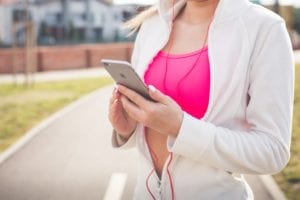Written Chrystal Moulton, Staff Writer. Using a telemetric approach, researchers were able to attribute smart phone addiction, found in 36% of the study participants, to specific personality traits.
 Some of us have lived long enough to remember the very first cellular device. Since the inception of cell phones, the technology has morphed into something most of us would never have imagined and certainly find very hard to live without–the smartphone. In fact, one study showed that smart phone users exhibited feelings of anxiety and cognitive delays when separated from their smart phones.1 In the US alone, smart phone ownership has risen by 76% in undergrad students.2 Also it is estimated that students spend 3.5 or more hours on their smart phones every day just for chatting and entertainment.3
Some of us have lived long enough to remember the very first cellular device. Since the inception of cell phones, the technology has morphed into something most of us would never have imagined and certainly find very hard to live without–the smartphone. In fact, one study showed that smart phone users exhibited feelings of anxiety and cognitive delays when separated from their smart phones.1 In the US alone, smart phone ownership has risen by 76% in undergrad students.2 Also it is estimated that students spend 3.5 or more hours on their smart phones every day just for chatting and entertainment.3
In an investigative study4, researchers wanted to objectively identify psychological traits attributed to app usage and predictors of smartphone addiction. 163 One hundred sixty-three undergraduate and post-graduate students in a teaching hospital located in western India were recruited for this study. Subjects had to use an android based smartphone to be included. After consenting to the trial, participants first underwent various psychological assessments which consisted of a Clinical Data Sheet to gather sociodemographic data, Big Five Inventory to measure five factors of personality, Materialism Value to measure materialistic influence on achieving life goals, Perceived Stress Scale to measure stress perception, Ego Resilience to measure stress adaptability, Levenson’s Locus of Control Scale to measure perception of cause and control over events in one’s life, Smartphone addiction scale to measure individuals perception of smart phone usage patterns.
Upon completion of the psychological assessments, subjects were then asked to download specific apps on the smartphone to track various activities and apps used over a 7-day period (listed in table 1). All participants were required to follow up with researchers after the 7-day period was completed. Researchers then downloaded the data from the apps tracking individual usage from each subject’s smartphone and proceeded to delete the apps after the trial was completed.
In the end, 140 students (70 males and 70 females) completed the trial. Based on SAS scores, 36.4% (51/140) of students showed smartphone addiction. Addicted students spent more time on their smartphones (p=0.043) and locked/unlocked their phones significantly more times than other participants (p=0.027). Female participants spend significantly more time on incoming (p=0.004) and outgoing calls (p=0.043), the photo gallery (p=0.024), and using the smartphone camera (p=0.002) than their male counterparts. Males, on the other hand, utilized online video streaming apps (p=0.05) and academic apps (p=0.039) significantly more than females. They also used significantly more data on their smartphones than females(p=0.001). Researchers found that Score on the perceived stress scale, internal/external locus control on the Levenson’s Locus of Control Scale, and specific personality traits on the BFI inventory (agreeableness, conscientiousness, and neuroticism) were significant predictors of smartphone addiction scores (p<0.05). Based on the psychological assessments, researchers were also able to attribute specific personality traits to the use of specific smartphone apps.
Overall, researchers believe that this study presented a more objective evaluation of smartphone addiction and sheds light on psychological traits that serve as predictors to the use of specific smartphone applications and overall addiction. They hope that this study will encourage further research into objectifying the relationship between psychological traits and smartphone addiction.
Source: Prasad S, Harshe D, Kaur N, et al. A Study of Magnitude and Psychological Correlates of Smartphone Use in Medical Students: A Pilot Study with A Novel Telemetric Approach. Indian J Psychol Med. 2018;40(5):468-475.
Copyright : © 2018 Indian Psychiatric Society – South Zonal Branch. Creative Commons Attribution-NonCommercial-ShareAlike 4.0 License, which allows others to remix, tweak, and build upon the work non-commercially, as long as appropriate credit is given and the new creations are licensed under the identical terms.
Click here to read the full text study.
Posted February 6, 2019.
Chrystal Moulton BA, PMP, is a 2008 graduate of the University of Illinois at Chicago. She graduated with a bachelor’s in psychology with a focus on premedical studies and is a licensed project manager. She currently resides in Indianapolis, IN.
References:
- Cheever, NA., et al. Out of sight is not out of mind: The impact of restricting wireless mobile device use on anxiety levels among low, moderate and high users. Computers in Human Behavior 2014;37:290-297.
- Smith, A. US smartphone use in 2015. Pew Research Center 2015;1.
- Clayton, R. B., Leshner, G., & Almond, A. The extended iSelf: The impact of iPhone separation on cognition, emotion, and physiology. Journal of Computer‐Mediated Communication. 2015;20(2):119-135.
- Prasad S, Harshe D, Kaur N, et al. A Study of Magnitude and Psychological Correlates of Smartphone Use in Medical Students: A Pilot Study with A Novel Telemetric Approach. Indian J Psychol Med. 2018;40(5):468-475.
